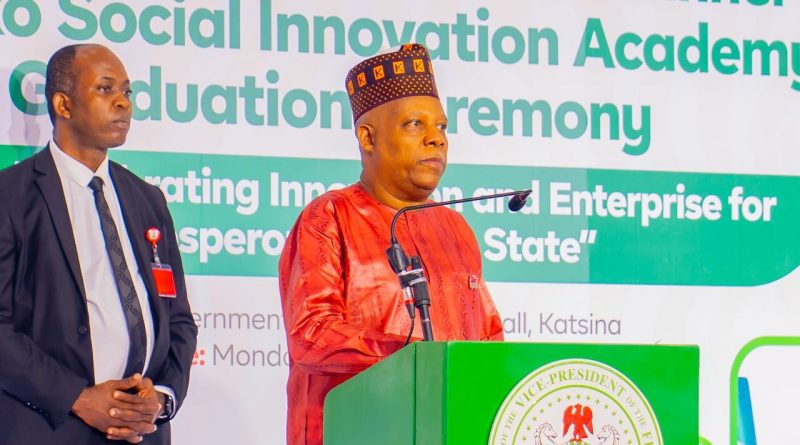Vice President calls for industrial revival in Northern Nigeria as Katsina’s innovation academy graduates first fellows
Vice President Kashim Shettima on Monday called for renewed industrialisation across Northern Nigeria, saying the region must convert its natural and agricultural resources into industries that create jobs and drive sustainable growth.
Mr Shettima made the call in Katsina at the graduation ceremony of the first batch of fellows of the Dikko Social Innovation Academy (DSIA) and the maiden edition of the Katsina MSME Awards, both designed to promote innovation and entrepreneurship in the state.
The academy, established under the Katsina State Enterprise Development Agency (KASEDA), trained 18 young people in social entrepreneurship, design thinking, and community-based problem-solving.
“Katsina is fast becoming a beacon of creativity and resilience in Northern Nigeria,” the Vice President said. “This state is reviving its legacy of craftsmanship and scholarship by empowering its young people to solve real problems.”

A model for Northern Nigeria’s economic renewal
Mr Shettima said the revival of small and medium-scale enterprises (SMEs) across the North was essential to addressing unemployment and insecurity.
He urged state governments to prioritise industrialisation by processing local raw materials such as cotton, hides, and millet into finished products.
“Governor Radda’s model is a reminder that innovation is not limited to big cities. What Katsina is doing should inspire other states to rethink their economic strategies,” he said.
The vice president also praised Governor Dikko Radda’s efforts to unify political and traditional leaders in the state, saying it was the kind of partnership needed to sustain development.
Inside Katsina’s innovation experiment
Governor Radda said his administration launched the Dikko Social Innovation Academy to nurture a generation of innovators capable of creating locally relevant solutions to social and economic challenges.
“When we came into office, we decided that the best way to fight poverty was to empower people through enterprise and innovation,” the governor said.
“That decision gave birth to KASEDA, which today stands as one of Nigeria’s most vibrant enterprise institutions.”
He explained that the DSIA model was inspired by Uganda’s globally recognised Social Innovation Academy and adapted for Katsina’s context, where youth unemployment and limited access to finance remain major barriers.
“These 18 fellows represent the first set of trained innovators from rural communities. Many began with little confidence but are graduating as changemakers,” he said.
Mr Radda said the academy has already launched its second cohort of 30 fellows, while a third set is scheduled to begin in January 2026.
₦1bn in youth and MSME interventions
The governor also unveiled the state’s first Katsina MSME Awards, which recognised 21 entrepreneurs and five special awardees.
He announced a car gift for the overall best MSME awardee and called on private firms and development partners to support future editions.
He said the state government has disbursed ₦500 million to youth and women entrepreneurs, and is implementing a ₦542 million partnership with the United Nations Development Programme (UNDP) to support MSMEs in conflict-affected areas.
Other initiatives include the ongoing MSME Census and Cluster Mapping Project and the establishment of the Dikko Business Development Service Corps to help small businesses access financing and expand sustainably.
“Our goal is to make Katsina the home of enterprise and innovation,” Mr Radda said. “We are not only celebrating ideas — we are investing in people who will build our future.”
KASEDA marks two years of enterprise growth
The Director-General of KASEDA, Aisha Aminu, said the agency has trained over 300 entrepreneurs in two years and is expanding into new areas such as climate-smart business and rural innovation.
She said the DSIA’s 18 fellows developed nine innovation projects across health, climate, and agriculture, while plans are underway to open new academy centres in Funtua and Daura.
“Our vision is to make social innovation a tool for solving everyday community problems,” Ms Aminu said.
She added that the MSME Awards attracted over 2,000 entries, with the winners selected transparently by an independent jury.
 A quiet reform in the North
A quiet reform in the North
Analysts say the Katsina model underscores a quiet but growing shift in Northern Nigeria’s development strategy — from dependence on federal allocations to home-grown innovation and skills-based enterprise.
According to the National Bureau of Statistics (NBS), more than 53 per cent of Nigeria’s youth are unemployed or underemployed, with Northern states worst affected.
Experts have long warned that insecurity in the region is tied to economic stagnation and joblessness.
READ ALSO: Jonathan, Shettima, Ooni, others hail NILDS DG as Jega advocates value-driven leadership
“What Radda is doing in Katsina is building an economic identity around youth and innovation,” said a policy analyst familiar with the initiative. “It’s a reform that can be scaled across the North.”
The event drew high-profile guests, including former Governors Aminu Masari and Ibrahim Shehu Shema, Ministers Ahmed Dangiwa (Housing) and Hanatu Musawa (Art, Culture and the Creative Economy), and members of the National and State Assemblies.
Mr Shettima, who extended his stay in Katsina to attend the event, described the innovation initiative as “proof that leadership can turn ideas into impact.”
“The story of Katsina is not just about graduation,” he said. “It’s about rebuilding Northern Nigeria’s legacy of enterprise.”

